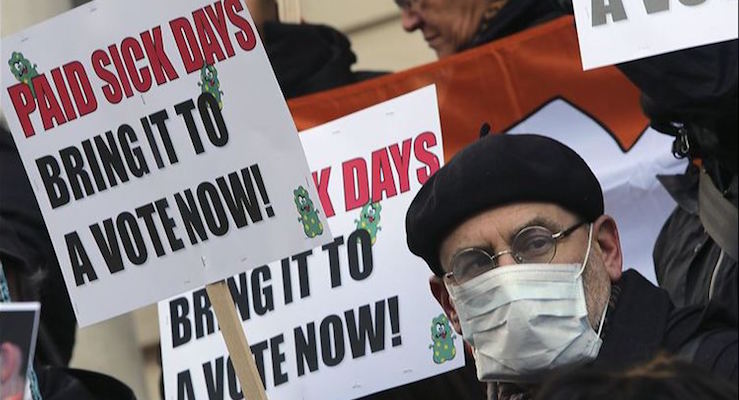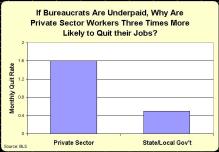

My biggest complaint about government employees is that they work for bureaucracies that shouldn’t exist. As far as I’m concerned, they may be the most wonderful, conscientious, and hard-working people in the world, but we shouldn’t have a Department of Housing and Urban Development or a Department of Agriculture, so these folks – by definition – are getting dramatically overpaid (i.e., anything about $0).
My second main complaint is that bureaucrats are overpaid relative to their counterparts in the private sector. About twice as much when you include the value of both wages and benefits.
The unions representing bureaucrats sometimes try to argue that this isn’t true, but I always point out the data on voluntary quit rates, which are much higher in the private sector compared to government. Needless to say, this is because folks who get cushy government jobs know they’ve won the employment lottery and have very little desire to switch to the private sector (where, as Dan Aykroyd explained in Ghostbusters, “they expect results”).
but I always point out the data on voluntary quit rates, which are much higher in the private sector compared to government. Needless to say, this is because folks who get cushy government jobs know they’ve won the employment lottery and have very little desire to switch to the private sector (where, as Dan Aykroyd explained in Ghostbusters, “they expect results”).
A third complaint is that politicians can’t resist catering to the unions that represent government employees, which means not only excessive compensation but also absurdly inefficient rules designed to protect loafers, scroungers, and con artists in the bureaucracy.
Let’s review the example of Queon Jackson. As reported by the Boston Globe, he’s pocketed a lot of money while doing absolutely nothing.
A former acting headmaster in Boston, placed on paid leave more than three years ago amid an investigation into credit card fraud, collected $375,000 in pay during his absence.
In the private sector, employment often is a tenuous situation. You can be fired “at will,” which means for just about any reason.
 But unions strike deals with compliant politicians (from the perspective of elected officials, bureaucrats are a special interest group with lots of voters and lots of campaign cash) to provide so-called employment-protection rules for government employees.
But unions strike deals with compliant politicians (from the perspective of elected officials, bureaucrats are a special interest group with lots of voters and lots of campaign cash) to provide so-called employment-protection rules for government employees.
And these rules make it very difficult and very expensive to deal with bad bureaucrats.
And it seems that Mr. Jackson meets that definition.
Jackson’s case reflects the thorny issues school systems face when union-protected employees are under federal investigations that drag on for months or years without charges being filed. Jackson, who was classified as an assistant director at the time of his paid leave, is a member of the school system’s union for midlevel school administrators, and the school system would have had to establish just cause to fire him. Thomas Scott, the executive director of the Massachusetts Association of School Superintendents, said…The choice…comes down to this: Either put the person in a low-profile desk job and face a potential public backlash, or fire the employee and run the risk of a lawsuit.
Here’s why Jackson got in trouble.
The school system originally placed Jackson on leave in February 2013, after learning the Secret Service was investigating him for an alleged role in fraudulently obtaining credit and then not paying the bills. But Jackson had contended that he was victimized by someone who stole his identity in an attempt to buy a car.
Though he already had a shady background when he first entered the bureaucracy.
In 2000, a few months before the district hired Jackson as a teacher, he admitted to sufficient facts for a finding of guilty in a drug case and a domestic abuse case that required him to take an anger-management course. That type of plea is commonly used by defendants to avoid a criminal record. …Jackson, who was a state social worker at the time, was charged with possession with intent to distribute counterfeit drugs.
Returning to the current situation, it’s not clear from the story, but I gather investigators from the Secret Service didn’t have enough evidence to nail Jackson, so the school system had no choice but to not only keep him on the payroll, but also to give him a new position.
Now Queon Jackson…is back. …The school system quietly cleared Jackson to return to work on May 9 and gave him a desk job at the agency’s headquarters and the title “special assistant.” The move ended a paid leave of three years and three months, during which he did no work for the school system. …He is receiving an annual salary of about $120,000, equivalent to what he made as a school administrator.
Though he apparently hasn’t been a model employee since his return.
Jackson has been accumulating many absences over the last two months, missing at least 16 days, including seven without pay, according to a Globe review of payroll records. The tally doesn’t include time he took off in mid-July.
Oh, by the way, Jackson is just one of many bureaucrats who get this strange form of paid vacation.
Boston’s school system currently has 34 employees on paid leave.
I shudder to think what the nationwide number looks like, but apparently there are tens of thousand federal bureaucrats getting paid leave. You can see a couple of strange examples by clicking here and here.
 The bottom line is that Mr. Jackson isn’t special. Lots of bureaucrats get to scam the system because union contracts protect dodgy employees. So he doesn’t merit membership in the Bureaucrat Hall of Fame, but it’s still outrageous that taxpayers in the productive sector pay extra tax to subsidize this nonsense.
The bottom line is that Mr. Jackson isn’t special. Lots of bureaucrats get to scam the system because union contracts protect dodgy employees. So he doesn’t merit membership in the Bureaucrat Hall of Fame, but it’s still outrageous that taxpayers in the productive sector pay extra tax to subsidize this nonsense.
If you like humor about overpaid government employees (and you’re paying for it, so you may as well get some enjoyment), here’s a great top-10 list from Letterman and here’s a cartoon about the relationship of bureaucrats and taxpayers. Looking through my archives, I also found a joke about an Indian training for a government job, a slide show on how bureaucracies operate, a cartoon strip on bureaucratic incentives, a story onwhat would happen if Noah tried to build an Ark today, and these two posters. There’s also a good one-liner from Craig Ferguson, along with this political cartoons from Henry Payne.






